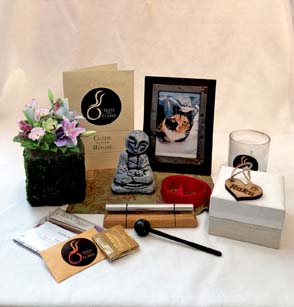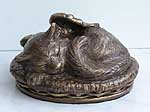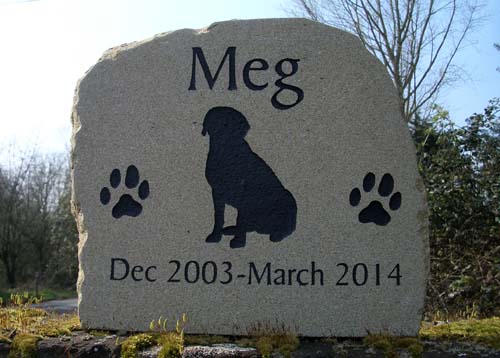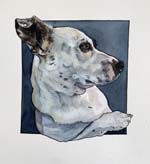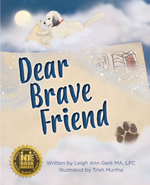See Moira Allen's recent video interview on pet loss!
Send in the Clones?
by Moira Anderson Allen, M.Ed.
In February 2002, researchers at Texas A&M University created the first successful cat clone. "Carbon Copy," or "CC," is a cloned kitten who is the exact genetic duplicate of her cell-donor mother. CC was created by transferring the nucleus of a cell from an adult cat into an ovum from which the nucleus had been removed.
What pet owner can read such an article without at least thinking about what this might mean with respect to one's own pets? And, indeed, CC was the result of exactly this kind of thinking. Her cloning was sponsored by a couple who have laid out, thus far, $3.7 million on the "Missyplicity Project" -- an effort to clone their beloved 12-year-old dog, Missy. Cloning a cat is apparently easier (!) than cloning a dog, so in a sense, Carbon Copy is just a step on the road toward cloning Missy.
I don't know about you, but I don't happen to have $3.7 million lying around the house; sometimes the monthly cat food bill seems a strain on the family budget. But I confess that I'm hardly immune to the temptation inherent in the promise of cloning. I can't help but look at my beloved Brisco-cat, for example, and fantasize about a life in which I would never actually have to "lose" my furry buddy.
Might cloning our pets be the long-sought solution to the pain of pet loss? Would it mean an end to grief -- by offering an alternative to actually LOSING a pet? Obviously Missy's owners think so. In addition to attempting to recreate their own companion, they hope to offer a commercial dog-cloning service (and, presumably, one that would clone cats as well). Can we possibly envision a day when such a service would be available to the average pet owner?
More importantly, should we?
I know that many pet owners would respond to this question with a resounding, unqualified YES. The idea of "keeping one's pet forever" is seductive -- and the idea of never having to go through the pain of losing that pet is even more tempting. No one enjoys pain; who wouldnÕt try to avoid it, if possible?
But by cloning a pet, would we truly "have" that same pet "forever"? Would we actually avoid loss? And in the process, might we not lose far more than we could ever gain? I believe the answers are "no," "no," and "yes."
The Same, and Not the Same
The only reason to clone a beloved pet is to recreate that pet -- to create a copy that is identical to the original. More accurately, our desire would be to recreate the relationship that we had with our pet -- because it is the loss of that relationship that brings grief. So, in effect, the goal of cloning would be to create modular, interchangeable pets that we could swap in and out of an ongoing relationship -- when one pet dies, we simply substitute the next clone, and the next. Which might be OK, perhaps, if it would actually work. But a little logic suggests that it won't.
The first, and most obvious, problem is that while a cloned pet may be the genetic duplicate of the original, it is not the same animal. (Ironically, while Carbon Copy is genetically identical to her donor-mother, she does not even look like her mother!) What we love about our pets is not their genes, but their personalities. I don't intend to get into a lengthy discussion of "nature vs. nurture," but I'm sure most of us realize that while personality may have genetic factors, it is also profoundly shaped by the experiences an individual has from birth onwards.
Anyone who has raised puppies or kittens, or adopted siblings from the same litter, also knows that animals with virtually identical genes (and raised in the same environment) will evolve highly individual personalities. Even identical twins develop profound differences. And that's what a clone is, really: A twin to the individual that provided its DNA.
Thus, one must realize the sad truth: A clone of your favorite pet will never be the same pet. It will be a new, unique individual. It is not your pet reborn, photocopied, duplicated, or whatever. It is an entirely new animal that happens to share your pet's genetic makeup. Nor can you hope to duplicate the conditions that shaped your original pet's personality, even if you raised both pets from infancy in the same "environment" -- because there is no such thing as "the same environment."
For example, let's say that your first pet grew up with your daughter, who was three when you brought that pet home. Twelve years later, you clone a new pet -- but now your daughter is 15! Obviously the new pet's experiences are going to be different from those of the pet who grew up with a three-year-old. Nor are you the same person you were 12 years ago, so your own behavior and interaction with the pet will be different as well.
A Recipe for Rejection
If the purpose of cloning is to recreate a pet, and a relationship, "just as they were before," then the result is sure to be disappointment. Rather than allowing a clone to develop its own personality -- and coming to know and embrace that personality -- a pet owner will expect the clone to "act" like the original, and to develop the traits and personality of the original. When this doesn't happen, the pet owner is bound to be disappointed; the clone is not turning into the pet that the owner "wanted." Instead of judging the clone on its own terms, the pet owner will measure it against the memory of the beloved "original" -- and the poor clone will never "measure up."
Fortunately, it's hard to imagine animal shelters becoming suddenly overcrowded with rejected clones. At $3.7 million a pop, it will be awhile before we experience the problems of "back yard cloning," or "puppy clone mills." (Eventually, however, it could happen.) Instead, we'll simply have a lot of very disappointed (and somewhat poorer) pet owners who not only haven't managed to avoid the pain of loss, but have actually hindered their ability to enjoy a new relationship. And that, perhaps, is the key argument against cloning your pet in the first place.
Love Lives On
All of our pets are beloved and special, but sometimes one comes along who seems extra-special. Of our three cats, Brisco is the one who stands out as extra-special; he's the lover, the wuss, the killer-of-gumballs, the cat-who-thinks-he's-a-dog. And I can't deny how tempting it would be to imagine that I could clone Brisco and keep him with me "forever."
That temptation fades when I stop and think about how it is that I happen to have Brisco at all. The argument for cloning is to prevent grief and loss -- but I have Brisco because of grief and loss. We adopted Brisco after the death of our last "extra-special" cat, Lessa, who died of cancer in 1996. As Lessa was dying, I wondered if I would ever be able to love a cat as much as I loved her -- if I would ever be able to experience this wonderful, magical relationship again. Lessa had been with us for 15 years -- and from almost the beginning of my husband's and my relationship. There is something very special about a pet who has gone through so many "formative" experiences in a couple's life -- wherever we went, and whatever we went through, Lessa was there. Losing Lessa was like losing a connection to our "early years."
But lose her we did, and we grieved, and wept, and felt a huge hole in our lives. When we went to the animal shelter to look at kittens, I fought the temptation to look at those who looked "just like" Lessa -- I knew that deep down, I wanted Lessa back, and I knew I couldn't have that. Then Patrick spotted a bright-eyed, big-eared kitten in a cage. The cage had a sign on it: "Landlord hold." We found out that the kitten had been "spoken for" -- but because the would-be owners were renters, they had to obtain their landlord's permission before they could adopt. The "hold" ran out in an hour. Learning that we could not "reserve" the kitten if the other couple didn't come back, we stood guard over that cage for an hour -- and then brought Brisco home.
I won't go on and on over what a marvelous cat Brisco is, because that's not the point. The point is, if we could have somehow cloned not only Lessa but our relationship with Lessa, we would not have Brisco today. Moreover, in a shelter crowded with cute, adorable kittens, who is to say whether Brisco would have found a home -- or suffered the fate of so many "surplus" shelter cats. Pets die, but love lives on -- and if we found a way to prevent the first part of that equation, we might actually cheat ourselves of a far greater blessing.
* * *
Grief hurts. Pet loss is devastating. But we can survive it. Cloning beloved pets won't make the pain go away -- and it won't help the thousands of unwanted pets who perish every year because there just isn't enough love to go around. While I can understand the desires of Missy's "parents", I wonder if they ever thought about how much good that $3.7 million could have done for the pets that nobody wants -- instead of going toward an effort to recreate the one pet that they want. Should the day come when "Genetic Savings & Clone, Inc." really can offer ordinary pet owners the chance to reproduce their favorite pets, you'll find me -- and thousands of other pet owners -- down at the shelter, signing adoption papers.
For more information:
Molecular Meow Mix Creates Copy Cat Clone -
http://www.accessexcellence.org/WN/SU/SU102001/copycat.html
The Missyplicity Project -
http://www.missyplicity.com/
Pet Cloning Ban Considered in California (February 9, 2005) - http://www.msnbc.msn.com/id/6943243/
An Alternate View
Here's an alternate view from a reader:
Dear Moira,
First, let me say that this is by far one if not the best pet loss site I've encountered. That said, I hope that perhaps I can ask you to reconsider and perhaps re-write your page on cloning. I realize that there may be many people who would be thinking EXACTLY as you note, looking to replace their pet with a duplicate. I totally agree with your view of that, its simply not going to happen, its not a way to avoid the grief.
That said, there are also many people who realize completely that a clone wouldn't be a duplicate but a totally different individual. The thing is, perhaps one very much wanted an offspring from their pet in order to have a relation to the loved pet but it never worked out for one reason or another. Maybe timing, job, career, or even that the pet was already neutered when obtained. In these cases, at least the clone would have the same genes, would have the same propensity to be similar to the original pet -- would likely be every bit as much like the pet as an offspring from a carefully chosen mate could be, if not more so.
I realize that at this point cloning even a cat is outrageously expensive (the first nine to be cloned have either been or are being chosen as I type, for 50K apeice I understand). The more that are cloned, however, and the more common it becomes, the cheaper the cost will be. Its estimated that within 10 years it will cost roughly 5K or less to clone a pet. Currently, with veterinary costs as they are, one can easily run that amount up if one can even afford to, in end of life care for things like cancer, chronic renal failure, etc. That's less than a car by far, and while certainly not as practical and useful, most of us sure love our pets far more than a car, and for many many more years than a car. So if one goes into it with open eyes, realizing that it will NOT be the same animal, NOT a duplicate, but rather a brand new animal with the same propensities as the original -- how is this any worse than breeding an entire litter where one must be able to find homes for all and keeping one for oneself to have a small bit of the pet one loves so very very much?
I would just love to see the peice on cloning be a little more balanced in that regard.
-- Robin
And the inevitable rebuttal...
I agree that there will be a small number of people, like you, who could pursue cloning from a balanced perspective, aware that it would indeed create a unique individual. However, I still believe that in general, should cloning become "affordable", the majority of people who choose this option would be those who really are trying to recreate a "perfect pet" -- to regain a carbon copy of a pet who has died, and who will not only be disappointed by the fact that the pet ISN'T identical but who may also, in the process, make that unfortunate pet's life miserable by attempting to shape it into something it isn't, or by rejecting it for not being what they wanted.
In addition, every cloned pet equals one DEAD pet -- not the pet you lost, but rather, the pet that you or someone else failed to adopt from a shelter and that therefore had to be euthanized. In addition, how many of those "failed" clones (the ones that didn't turn out the way the unrealistic owner hoped) are going to end up in shelters as well? If cloning does become "affordable," then my previous statement about clones NOT ending up in pet shelters will likely no longer apply! In theory, attempting a clone needn't be a one-shot deal; a pet owner could, presumably, keep trying until they seemed to "get it right." What happens to rejected clones?
So I'm afraid I'm still against the idea.
-- Moira Allen
Copyright © 2002 by Moira Allen. This article originally appeared on the Allpets website.
When a pet dies, you want help... fast!
You'll find it in Moira Allen's Coping with Sorrow on the Loss of Your Pet. In a book filled with comfort, compassion and support, you'll find the tools and tips you need to:
 |
- Understand the feelings you're going through -- and find ways to ease the pain
- "Say good-bye" with memorials, tributes and other coping strategies
- Help your children and other family members deal with their grief
- Deal with people who "just don't understand"
- Help surviving pets cope with the loss of a missing companion
- Come to terms with the guilt we so often feel when a pet dies
- Handle the agonizing decision of euthanasia
- Choose the best and most comforting "final resting place" for your pet
- Determine when and how to bring a new companion into your home (how soon is too soon?)
- Improve your chances of recovering a lost or stolen pet
- Help a friend cope with loss
|
Coping with Sorrow on the Loss of Your Pet celebrates over 30 years in print -
our expanded Third Edition is available from Amazon.com in Print and Kindle editions!*
*(Please note that these are affiliate links. As an Amazon Associate I earn from qualifying purchases.)
Quantity discounts are also available; please visit our Quantity Orders page for details.
|

 HOME ·
HANDOUTS ·
Links ·
Pet Loss Hotlines ·
List Your Organization ·
List Your Product
HOME ·
HANDOUTS ·
Links ·
Pet Loss Hotlines ·
List Your Organization ·
List Your Product